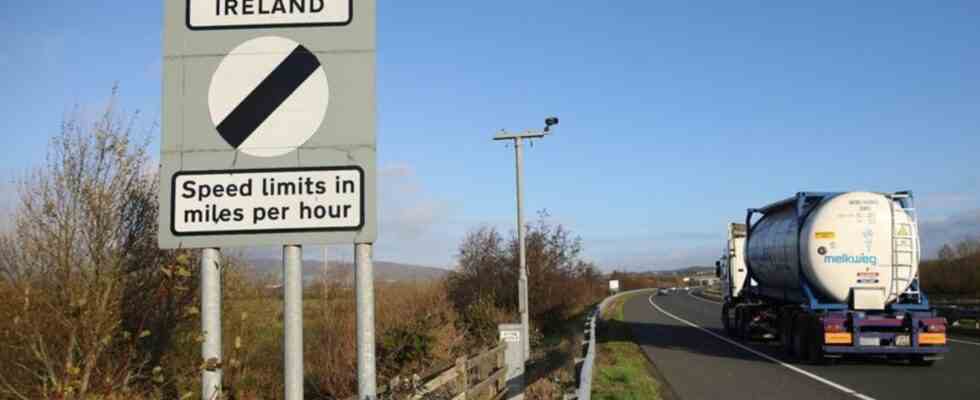Answer questions
The Brexit Curse: What the Northern Ireland Protocol is all about
A road sign saying ‘Welcome to Northern Ireland’ on the border between Northern Ireland and the Republic of Ireland. photo
© Peter Morrison/AP/dpa
The Northern Ireland issue has been the trickiest issue in the Brexit negotiations from the start. After Britain’s exit from the EU, she strained the relationship between London and Brussels.
EU Commission President Ursula von der Leyen and British Prime Minister Rishi Sunak reached an agreement on Monday in the tough dispute over the Brexit rules for Northern Ireland. The most important questions about this:
What does the agreement mean?
If the agreement proves to be resilient, the dispute over Brexit might finally end. In the almost seven years since the British narrowly voted yes in a referendum, the issue of leaving the EU has been used again and again as an instrument for power struggles in the conservative governing party. Sunak is under pressure from his predecessor Boris Johnson, who may be hoping for a comeback if he presents himself as a pro-Brexit doc. For Sunak, it’s about getting the bickering over with so that he can devote himself to the ailing health system and the ailing economy. Voters are now much more interested in these issues than Brexit. Whether it is successful now depends above all on whether the Northern Irish Protestant party DUP accepts the agreement.
Why has the argument lasted so long?
In fact, the question should have been answered long ago. In 2019, then Prime Minister Johnson celebrated the “Northern Ireland Protocol” with the EU as a great success. After years of wrangling, a no-deal Brexit was averted. With the slogan “Get Brexit Done,” Johnson won a major election and led his country out of the EU. But it soon became apparent that he probably never intended to stick to protocol. Great Britain implemented the agreement slowly, called for renegotiations and tried to make it invalid by law in its own country. In addition, the support of the DUP was missing. So far it has also blocked the formation of a regional government in Northern Ireland.
Why is Northern Ireland such a sensitive issue?
When Ireland gained independence from the UK around 100 years ago, the island was split in two: the predominantly Catholic south became the Republic of Ireland, while the north, with its Protestant majority, remained part of the kingdom. The Protestants dominated the administration and economy there, while the Catholic minority was economically disadvantaged for a long time. This led to a civil war in which the Catholic-Republican group IRA tried to force a unification of both parts. Security forces, the army, and Protestant militias hit back hard. Thousands lost their lives before the 1998 Good Friday Agreement brought peace.
Why did old conflicts threaten to break out with Brexit?
The crossings at the inner-Ireland border used to be heavily secured to prevent IRA fighters and terrorists from crossing. At the same time, border guards were often the target of attacks because pro-unity advocates saw them as symbols of oppression. The EU memberships of both countries later made customs controls there superfluous. However, with Brexit, customs borders became necessary again so that Northern Ireland does not become the back door of smuggled goods into the EU internal market. In all probability, however, new barriers would have become the target of the still active IRA splinter groups. This should be avoided at all costs. The peace is still shaky.
What does the Northern Ireland Protocol say?
The protocol is an alternative to Johnson’s predecessor Theresa May’s so-called backstop plans, according to which the whole kingdom should continue to follow EU rules. The goal is a harder break with the EU. The protocol provides for England, Scotland and Wales to be completely cut off from the EU. Only Northern Ireland follows the rules of the EU internal market and customs union, so there are no checks at the land border with Ireland. Instead, controls should now be carried out when goods from Great Britain arrive at the ports in Northern Ireland. That is why there is also talk of a customs border in the Irish Sea.
What were the consequences of the protocol?
Northern Ireland thus has a special status. It is part of both the European Customs Union and the UK Customs Territory. For the economy, this is a clear advantage over other parts of the country. However, there have also been difficulties, such as sending parcels, delivering medicines and taking pets from the UK to Northern Ireland. Overall, the new regulations strengthened trade relations between Ireland and Northern Ireland and weakened those between Great Britain and Northern Ireland. Union supporters felt increasingly cut off from Britain.

